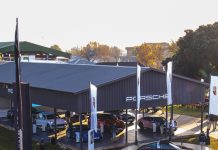Akani 200 offers fuel efficiency, value for money and cleaner fuel. Its patented chemical formula consists of high-energy and reactive nitro alkane concentrates as well as organic hydrocarbon compounds that are non-metallic and oxygen intensive.
It actively breaks up long carbon chains, releasing additional chemical energy in fuel with no harmful effects on engines. It enhances combustion efficiency through continuous fast burn and a high rate of heat release.
Its award-winning combustion detergency technology removes up to 94% of carbon and varnish deposits in fuel injectors. It restores engine performance and prevents excessive repair costs. By reducing carbon particles, the lifespan of diesel particular filters (DPF) and marine diesel engines is prolonged.
Without Akani, the deposits on the cylinder liners require twelve hours of soaking in water and a steel mesh to brush it off. With Akani, the deposits are soft and powdery and are easily washed away with a water hose. The liner wear is reduced by 25% to 50%, prolonging its lifespan and providing a fuel saving of up to 7,4%.
With Akani the ash on the heat exchange of industrial boilers can be washed away by using a water hose and fuel savings are estimated at 12,83%. It reduces significant amounts of diesel particular mass (DPM), the cause of exhaust backpressure. This extends the lifespan of the DPF.
It has also been proven to significantly decrease particle emissions, subsequently reducing air pollution. Scientific studies have confirmed that COVID-19 and other viruses are attached to the particles in air pollution. During underground mine testing in Australia a reduction of up to 89% in nano particle emissions was reported, providing cleaner air in underground mining.
Akani is especially effective in removing and preventing the formation of carbon deposits in engines, thus helping to reduce repairs and to prolong engine operation lifespan. With today’s low fuel prices, the value of clean air to protect humans as well as engine protection should predominate consideration on fuel quality selection.



















